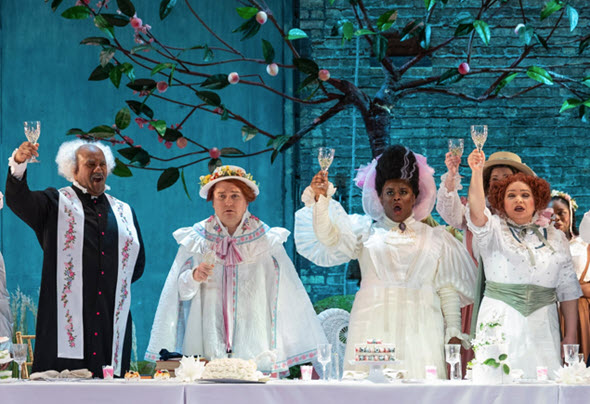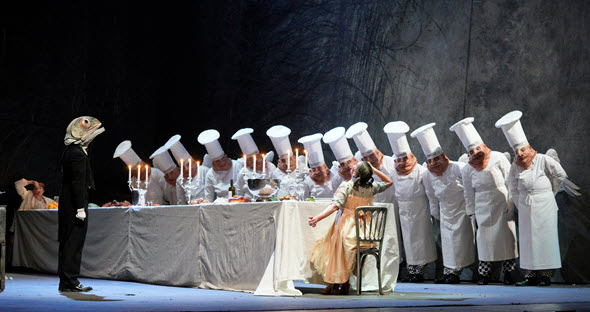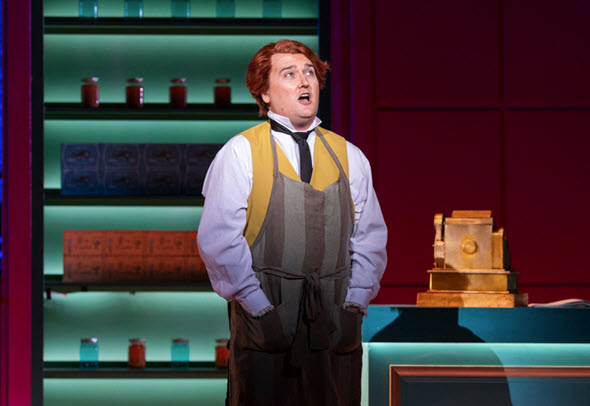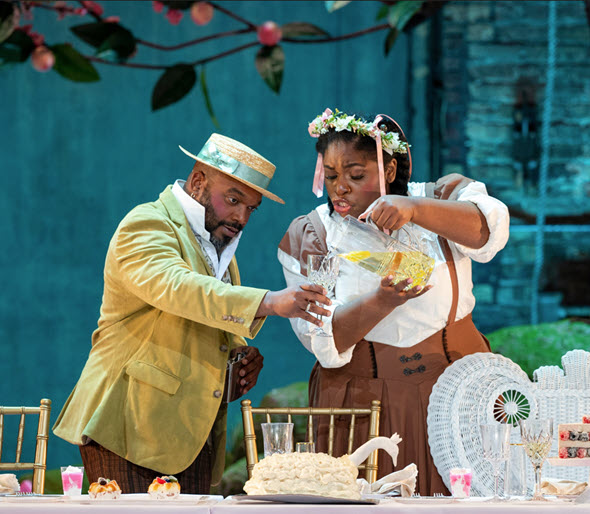Two masterly maestros meet some crazy kids: ‘Hansel and Gretel,’ ‘Albert Herring’ on stage

Hansel (Samantha Hankey, left) and Gretel (Heidi Stober) celebrate the demise of the evil witch. (Cory Weaver photo)
Review: “Hansel and Gretel” by Engelbert Humperdinck at Lyric Opera of Chicago through Feb. 5; “Albert Herring” by Benjamin Britten at Chicago Opera Theater, closed.
By Lawrence B. Johnson
What might a couple of poor kids lost in the woods and a shy, sheltered lad in the city have in common? The answer, played out in a romp through Humperdinck’s “Hansel and Gretel” at Lyric Opera of Chicago and a gentle, delightful go at Britten’s “Albert Herring” at Chicago Opera Theatre, is – spunk!
“Hansel and Gretel,” as eloquently and vivaciously conducted by Andrew Davis as it is wittily and wildly staged, continues at Lyric through Feb. 5. “Albert Herring,” an altogether stylish and polished production led by Jane Glover, had an all-too-brief weekend run Jan. 26-29 at the Athenaeum Theater. Call them both sleepers. Britten’s comedy is a comparative rarity, at least on this side of the pond, and Humperdinck’s romantic spin on the Grimm fairytale taps into the clever (and wayward) child that resides deep in all of us.
The early history of “Hansel and Gretel” is worth noting. The world premiere, in Weimar in 1893, was conducted by Richard Strauss; the next year, in Hamburg, the opera was presented under the baton of Gustav Mahler. Though its first performance fell on Dec. 23 and the opera has often been revived as something of a Christmas staple, the story has nothing to do with Christmastide – but everything to do with privation, little sibling pals and the magic of The Woods. I’m sure the story does not need to be repeated. Or maybe in brief, anyway this version:
Hansel and Gretel, let’s say ages 10 and 8, live at the edge of a woods with their mother and father, a broom-maker. The family is very poor, and the children are hungry. On this day, both parents are away and the naughty kids have neglected their chores in favor of some dancing around the kitchen, and in their merriment they break a jug of precious milk. When beleaguered Mum suddenly walks in, she scolds the little scamps and sends them off to the woods to pick berries for dinner. Soon after, Father arrives, laden with food he has purchased from a boom in broom sales. But he’s stunned to hear that his children have gone into the woods, specifically to a place that is cursed and inhabited by witches. The parents rush out to rescue the kids.
Meanwhile, Hansel and Gretel dutifully fill their basket with berries – then proceed to eat them all! Night descends, and they can’t find their way home. They sleep in the woods, under the protection of angels. Next morning, they discover an amazing little house made of cookies and sweets, and happily begin nibbling morsels. An old woman who lives there greets them and invites them inside, where she ensnares them both and makes ready to bake them in her oven. But sly, quick Hansel and Gretel turn the tables, push the old crone into the oven and thus bring back to life all the children she has transformed into statues.
One of the hardest tricks to pull off for adult actors is to portray children. Mezzo-soprano Samantha Hankey (Hansel) and soprano Heidi Stober (Gretel) just seem to let it rip, and we are instantly watching two artists whose earnest joy and heedless cavorting somehow transform them into adorable kids. Stober’s boundlessly energetic Gretel, arms and legs constantly waving and wagging, is amazing to watch. Both singers deliver the deceptively splendorous vocal goods. Humperdinck’s music is one grand paean to Wagner, and Hankey and Stober – now children to our eye – unfailingly catch us unawares with musical lines that swell and soar.
Mezzo-soprano Jill Grove is a sweetly menacing Witch, imposing of voice and wholly caught up in the crazy, flour-and-batter-spewing fun of it all. Talk about a food fight. The kids and the Witch make quite a mess of the stage and themselves.
A creative highlight of this beguiling production revival directed by Eric Einhorn is the famous Dream Pantomime in which guardian angels hover over the sleeping children in the woods. Here the angels are a cluster of chefs in the children’s shared dream of a banquet of plenty, Hansel and Gretel seated at opposite ends of a long table as they are served by a tuxedoed fish. The extended orchestral interlude, the most widely known part of the opera, became the peak moment in Davis’ masterly musical direction and a reminder of what an excellent ensemble serves in the Lyric pit.
Davis, who served as Lyric’s music director for two decades before stepping down in 2021, was officially installed as music director emeritus by company general director Anthony Freud at the opening-night performance of “Hansel and Gretel.”

Albert Herring (Miles Mykkanen, second from left) tries to make the best of it as May Festival King as he is toasted by, from left, the Vicar (Billy McMurray), Lady Billows (Whitney Morrison) and his mother (Leah Dexter).
Albert Herring, the unworldly young chap at the center of Britten’s lovely 1945 comedy, is hardly the rambunctious likeness of Hansel or Gretel. Albert, who has grown to maybe his late teens under his mother’s severely restraining thumb, is repression’s poster boy. He’s also exactly what a small English town’s high society is looking for when no suitable girl can be found for crowning as Queen of the May Festival. Fair Albert gets the nod as well as the 25-pound cash prize that goes with the honor. Then the unthinkable happens: Albert goes off the moralistic rails and squanders a little of the cash on a night of drunkenness and, well, we know not what else. In the end, he’s a changed man; or rather, he’s become a man.
Chicago Opera Theater’s charming production created a real community of characters evocative of the inhabitants of comedies by the 18th-century English playwright Richard Sheridan. Characters both stock and multidimensional mix it up in a wacky romp that also summons the spirit of Gilbert & Sullivan. Britten’s writing for the voice is impeccable, so assured and expressive that one almost forgets that the characters are not speaking but singing. And a superb cast, under the veteran Glover’s expert musical guidance, delivered with tightly integrated assurance, together to the core.
As the soon-to-bloom Albert, tenor Miles Mykkanen cut a hilarious, but also quite sympathetic, figure – a lad who effectively sees that the door has been left ajar and bursts through it. He gets a good push from Vince Wallace’s Sid, a street-wise charmer who wants to see Albert spread his wings. Sid and his girlfriend Nancy (Veena Akama-Makia) nearly stole the show as a lusty young couple at odds with small-town form and expectations.
But the stock characters added their own appeal: Whitney Morrison as the grand dame Lady Billows, social ruler of the community; Justin Berkowitz as the posturing Mayor; Billy McMurray as the (cautiously) outspoken Vicar; Alissa Anderson as Lady Billows’ long-suffering attendant; Leah Dexter as Albert’s ever-exasperated mother. But whenever he was on stage, my eye went to Wilbur Pauley as the constable – an upright and circumspect guardian of the law cut whole-cloth from G&S. What a splendid assemblage of superb singers as engaged actors. And a collective tribute to the work of director Stephen Sposito.
Carolyn Rose Sullivan’s vibrant and expressive costumes were framed by the elegant simplicity of designer Irina Hadzi-Dordevic’s green-and-pink sets. All told, an enormously rewarding enterprise – not least from the orchestra pit, where Glover led an articulate and burnished performance of Britten’s original scoring for chamber ensemble.





